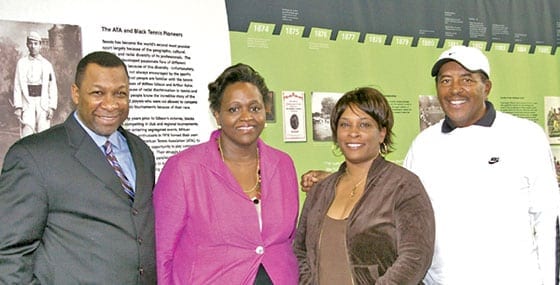
Sportsmen’s Tennis Club in Dorchester was the site of reflection and celebration last weekend as it hosted “Breaking the Barriers,” an exhibit honoring some of the most important black figures in tennis history.
Sponsored by the International Tennis Hall of Fame, “Breaking the Barriers” pays tribute to the American Tennis Association (ATA), created in 1916 to help promote the success of blacks in the sport. The exhibit includes memorabilia, a video presentation featuring an appearance by Sportsmen’s founder Jim Smith, and a massive banner with a timeline punctuated by old newspaper clippings and photos.
The timeline traces the history of the ATA, juxtaposing its past with major moments in American history, as well as significant milestones in black history. An annual lynching count appears just inches above references to major accomplishments by black players; the count runs for a startling number of years.
Thirteen-year-old Jandayia Lubin, one of the most promising junior players at Sportsmen’s, the oldest black-owned and -operated nonprofit tennis club in the U.S., called the exhibit “surprising.”
“I didn’t think there was so much torture that we had to go through,” Lubin said. “When you look at [the exhibit], it shows that we are all one and we came together to create this sport.”
Lubin was in awe last Friday when she was given the chance to meet and hit a few balls with Zina Garrison, a three-time Grand Slam mixed doubles champion and one of the most successful black female players in the sport’s history.
Garrison and her longtime coach, John Wilkerson, were honored at a luncheon, which also included a question-and-answer session moderated by WEEI radio host Michael Holley. Sidney Cooper, a former student of Wilkerson’s who is now director of tennis at Sportsmen’s, introduced the pair to the crowd of approximately 100. Following the luncheon, the two helped run free clinics.
Wilkerson has been coaching tennis in the Houston area for more than 30 years, and though he has seen his players have immense success on court, he said he believes there is much more to tennis than trophies.
“Tennis is like a vehicle,” Wilkerson said. “It will take [young players] wherever they want to go in life. Hopefully, tennis will give them the want and need to go to college.”
Wilkerson was also on hand last Saturday for the club’s Community Tennis Day, which invited the public in to see the exhibit and participate in free tennis clinics and drills. Sportsmen’s Executive Director Toni Wiley estimated that 200 people had visited by the end of the weekend, including United States Tennis Association New England President Ronald Friedman, students from local elementary schools and Sportsmen’s alumni.
Wiley said the weekend was a huge success.
“Club members and visitors were clearly taken by the exhibit, and the tennis clinics were a lot of fun,” she said. “We hope to bring the exhibit back when we begin our 50th anniversary celebration on Martin Luther King Day [of] 2010.”






